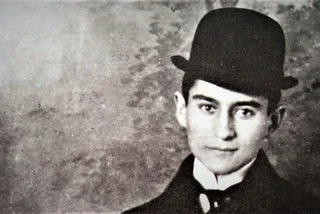Milan Kundera, a Czech-French author who ranks among the world's most translated writers, died on July 11 in his Paris apartment after a prolonged illness, according to the New York Times, which cited his French publisher.
The Moravian Library (MZK), to which Kundera had recently dedicated his entire archive, also confirmed the news of the author's death in a press release.
Czech Prime Minister Petr Fiala said Kundera was a writer who could reach generations of readers across all continents with his work and achieved world fame. “He was closely associated with Brno, even though he had to leave his country for political reasons. He left behind not only a remarkable work of fiction but also an important work of essays. Sincere condolences to his wife, Věra,” Fiala tweeted.
Czech Foreign Minister Jan Lipavský tweeted that Kundera was a Czech writer who conquered the world. “Although he spent much of his life in exile, he was one of our best-known natives ever. His books are world classics. Sincere condolences to his family, friends, and fans of his work,” he said.
OdeÅ¡el Milan Kundera, Äeský spisovatel, který dobyl svÄ›t. I když strávil znaÄnou Äást života v exilu, byl jednÃm z naÅ¡ich nejznámÄ›jÅ¡Ãch rodáků vůbec. Jeho knihy jsou svÄ›tovou klasikou. UpÅ™Ãmnou soustrast rodinÄ›, přátelům i pÅ™Ãznivcům jeho tvorby. pic.twitter.com/1zIkwEI4Gd
— Jan Lipavský (@JanLipavsky) July 12, 2023
Czech Culture Minister Martin Baxa said that with Kundera’s death, Czech and world literature lost one of its most outstanding contemporary writers. “His thinking about the basic values of European culture and his interest in individuals, his contribution to the history of the world novel is and will remain unmissable. Condolences,” Baxa tweeted.
Smrtà Milana Kundery ztrácà Äeská i svÄ›tová literatura jednoho z nejvýraznÄ›jÅ¡Ãch souÄasných spisovatelů. Jeho pÅ™emýšlenà o základnÃch hodnotách evropské kultury, jeho zájem o jedince, jeho vklad do dÄ›jin svÄ›tového románu je a zůstane nepÅ™ehlédnutelný. UpÅ™Ãmnou soustrast. pic.twitter.com/NtOS64AFfZ
— Martin Baxa (@MartinBaxa2) July 12, 2023
Milan Kundera has been one of the most prominent personalities of Czech literary scene since the end of the 1950s, and in the 1960s he significantly contributed to the intellectual reforms of the Prague Spring movement.
Banned from publishing in Czechoslovakia
His first novel, The Joke (Žert), published in 1967, attracted the attention of foreign publishers and readers. A 1969 film of that novel was banned shortly after its release and not seen domestically for the next 20 years.
The Soviet-led invasion of Czechoslovakia in 1968 and the subsequent era of Normalization led to a ban on his work. He went into exile in 1975 and worked as a professor at the University of Rennes and then in Paris.
International interest in his work grew after he went into exile. His 1984 novel The Unbearable Lightness of Being (Nesnesitelná lehkost bytí) was listed as one of the best novels of the year by The New York Times. It was adapted into a hit English-language film in 1988 starring Daniel Day-Lewis and Juliette Binoche, which further went to solidify Kundera’s international fame.
Starting with the 1993 novel Slowness (La Lenteur), he wrote in French. His last published novel was The Festival of Insignificance (La fête de l'Insignifiance), which came out in French in 2013 and in English in 2015. His work has been published in 54 languages and in more than 3,000 editions. His works were also published in Czech by the Toronto-based '68 Publishers, headed by author Josef Škvorecký.
Life-long interest in modern music
Born in Brno to a family deeply rooted in music, Kundera's father, Ludvík Kundera, a prominent music pedagogue and pianist, influenced his lifelong passion for modern music, particularly that of composer Leoš Janáček.
Kundera was born in Brno on April 1, 1929. His father, music teacher, and pianist Ludvík Kundera, was a pupil of Janáček. Kundera’s interest in modern music and in Janáček in particular stems from his father's influence.
He studied music composition before his attention was drawn to literary science and aesthetics, which he studied at the Faculty of Arts of the Charles University in Prague, and then transferred to FAMU, where he studied screenwriting and directing. He later taught world literature at FAMU.
Losing and regaining Czech citizenship
In 1979, his Czechoslovak citizenship was revoked after he called communist leader Gustáv Husák the “president of forgetting” in his novel The Book of Laughter and Forgetting. French President François Mitterrand granted him French citizenship in 1981. His Czech citizenship was only restored in 2019.
Over his career, he received dozens of world awards, including the Jerusalem Prize for Individual Freedom in Society in 1985 and the Order of the Legion of Honor in 1990. On April 1, 2023, the Milan Kundera Library opened in the Moravian Library (MZK).
It contains over 3,000 copies of various editions of Kundera's books and his archive of articles, reviews, and other documents. The library was established thanks to a donation from the Kundera family.
Since the late 1970s, Kundera's novels and essays have solidified their place in the global literary canon as confirmed by the world press who today have published numerous tributes the author.
Remembered around the world
The French paper Le Monde describes Kundera as a "novelist of existence," stressing his distaste for the word "writer." The daily Liberation writes of Kundera's "infinite freedom of writing" and recalled his relation to Prague-born German-language Jewish writer Franz Kafka. Le Figaro says Kundera's work has overcome ideological and philosophical contradictions.
"A tireless defender of the novel and the right to fiction with a complex intellectual and personal career," Le Monde writes, highlighting that Kundera held French citizenship since 1981. Le Monde also recalls that Kundera defended Salman Rushdie and his novel The Satanic Verses in order to defend the inviolable right to fiction.
German news magazine Der Spiegel and daily Die Welt have published devoted extensive obituaries about the work and life of the Czech-born writer who spent decades in French exile. Die Welt mentions that Kundera "liked to spice up his novels with philosophical excursions" and that he considered himself a defender of the European novel.
The death of the writer is being reported by all the world's major agencies.
"One of the strongest voices in world literature" and "a sarcastic illustrator of human destiny," the AFP French news agency writes of Kundera, describing him as a French-Czech writer and noting that he was one of the few writers to be included in the prestigious La Pleiade edition during his lifetime, in 2011.
American news agency The Associated Press (AP) writes of the "exiled satirist of totalitarianism" that Kundera became because of his dissident writings published in communist Czechoslovakia.
Kundera "mixed dark irony with philosophical musings to explore the human condition," the Reuters agency reports.












 Reading time: 5 minutes
Reading time: 5 minutes 
































